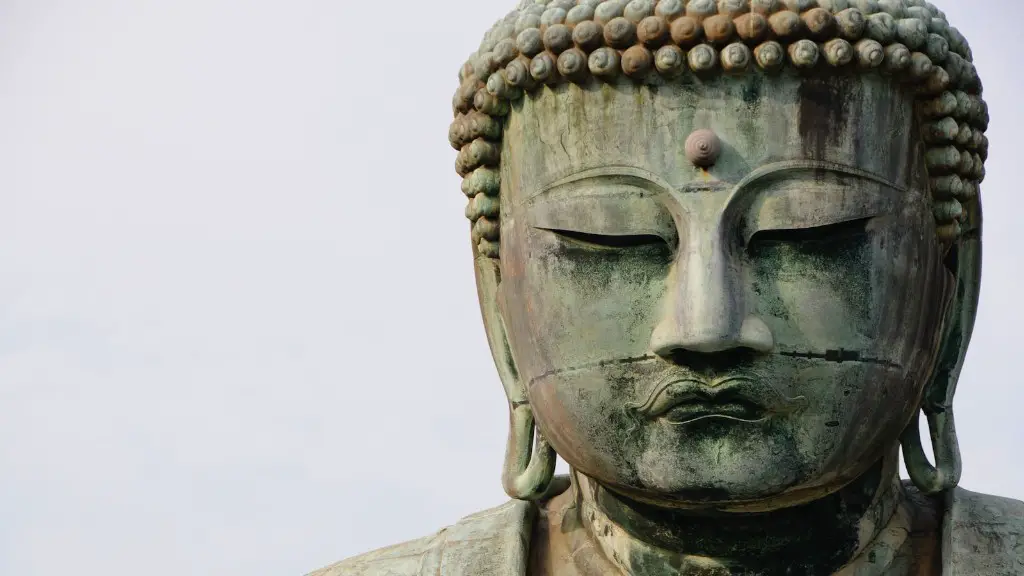Reconstructionist Judaism is a modern American Jewish movement that began in the early 1960s. The movement seeks to blend classic Jewish concepts with modern trends in order to create a unique brand of Judaism that is relevant to today’s Jews. The central ideas of Reconstructionist Judaism include the belief that Jews should live meaningful and ethical lives, focus on cultivating a vibrant Jewish culture, and recognize the historic centrality of the Jewish people to the land of Israel.
Reconstructionist Judaism is founded on the idea that the ancient texts of the Torah and other Jewish scriptures can serve as continuing sources of wisdom and guidance for modern Jews. The Reconstructionist movement emphasizes the importance of reclaiming traditional values and principles within the framework of a more contemporary, pluralistic expression of Judaism. Traditional religious practices such as study of the Torah and observance of the Shabbat are seen as an integral part of Jewish life, and the movement encourages modern Jews to embrace and draw upon these ancient practices as meaningful expressions of Jewish identity.
Reconstructionist Judaism also emphasizes the importance of social action and community engagement. The movement teaches that it is not enough to merely observe religious customs and participate in synagogue rituals; Jews must actively seek to build an ethical and just society. This can take the form of involvement in local community service projects or support for progressive causes, both in Israel and abroad. In addition, the Reconstructionist notion of justice emphasizes both a commitment to collective identity and a respect for individual needs and aspirations.
Reconstructionist Judaism is extremely progressive in its views on gender, family life, and sexual orientation. For example, Reconstructionist synagogues are gender-inclusive, and women and LGBT individuals are welcome to lead synagogues and rituals. Furthermore, Reconstructionist congregations are open and welcoming to interfaith families, and many Reconstructionist rabbis perform interfaith weddings and child dedications.
Though Reconstructionist Judaism is not as widely practiced as the more traditional denominations, it has been growing in popularity in recent years. The movement’s emphasis on progressive values, ethical living, and individual spiritual growth has drawn in many modern Jews who seek to create a unique, meaningful expression of their faith. As Reconstructionist Judaism continues to gain momentum, more and more Jews are finding spiritual fulfillment within the movement’s progressive and inclusive framework.
Reconstructionist Jewish Education
Reconstructionist Judaism places a strong emphasis on religion education for children and youth. As part of this mission, the movement has developed a comprehensive curriculum that focuses on Jewish history, culture, and ethics as well as a deep engagement with Jewish texts. The curriculum emphasizes hands-on learning, meaning that children are encouraged to explore issues such as social justice, the environment, and world religions in addition to traditional Jewish topics.
Reconstructionist congregations are also dedicated to providing religious education to adults. Many congregations offer a variety of classes and study sessions, often focusing on topics like Jewish spiritual practice, the history of Jewish thought, and religious ethics. In addition, many Reconstructionist communities organize special retreats and seminars for Jewish adults seeking to draw closer to their religion and culture.
Reconstructionist education often takes a creative approach and emphasizes the importance of direct experience. This can take the form of outdoor camps, service projects, and field trips. In this way, Reconstructionist educational programs seek to provide children and adults with an integrated learning experience that helps to develop their spiritual, intellectual, and moral selves.
Reconstructionist Jewish Marriage and Family
Reconstructionist Judaism places a strong emphasis on marriage and family. Traditional Jewish values are celebrated and reinforced, and couples are encouraged to build deep, meaningful relationships with each other and their families. The Reconstructionist view of family life is diverse, open, and inclusive: unmarried and same-sex couples, divorced couples, and interfaith couples are all welcomed and supported within the movement.
Reconstructionist Judaism also encourages members to craft personal, nontraditional Jewish ceremonies in honor of major life events such as birth, conversion, and coming of age. In these ceremonies, couples are free to celebrate their commitments to each other in whatever ways are personally meaningful. This freedom allows couples to create ceremonies that are deeply rooted in traditional Jewish values while still reflecting their own unique personalities and visions.
Reconstructionist communities also extend their commitment to marriage and family to other important occasions, such as weddings and funerals. Reconstructionist rabbis perform both traditional and contemporary ceremonies, often drawing on Jewish values to create something that speaks to the couple’s specific spiritual and cultural needs.
Reconstructionist Religion and Esoteric Beliefs
Reconstructionism embraces a variety of esoteric and philosophical traditions, including Kabbalah and mysticism. These teachings are seen as important sources of spiritual guidance and understanding, and they are often presented in classes and seminars held by Reconstructionist rabbis. Reconstructionist Jews are encouraged to explore these philosophies and draw upon them in order to craft a religious practice that is uniquely meaningful to them.
In addition to esoteric beliefs, Reconstructionist Judaism also allows for a great deal of theological exploration. Members are encouraged to explore various facets of Judaism, from ancient texts to modern-day interpretations, in order to develop their own personal understandings and spiritual practices. This openness to intellectually exploring and debating ideas is a key part of Reconstructionist spirituality.
Reconstructionist Practices and Rituals
Though Reconstructionism has no set liturgy, the movement has developed a range of traditional practices and rituals. Many Reconstructionist congregations observe Shabbat and major Jewish holidays such as Passover and Chanukah. In addition, Reconstructionist Jews also regularly attend bar and bat mitzvahs, celebrate lifecycle events, and conduct weekly Torah readings.
The Reconstructionist movement also places a heavy emphasis on mindfulness and spiritual development. As such, many Reconstructionist Jews incorporate practices such as meditation, chanting, and prayer into their religious expression. The primary goal of Reconstructionist spiritual practice is to foster a deeper connection between individuals and the divine.
Reconstructionist Leadership and Organization
The main organization for Reconstructionist Judaism is the Reconstructionist Rabbinical College (RRC). The RRC is responsible for providing education and ordination for individuals wishing to become Reconstructionist rabbis, as well as for providing resources for Reconstructionist communities and institutions. In addition, the RRC publishes a number of magazines and books on Reconstructionist topics.
The RRC is supported by the Reconstructionist Organization of Synagogues (ROS), which provides administrative and programmatic support for Reconstructionist congregations. The ROS also facilitates dialogue between the Reconstructionist movement and other streams of Judaism, as well as with interfaith groups, secular organizations, and progressive social movements.
Reconstructionist congregations and institutions are governed by a variety of committees and boards, all of which are made up of elected members. The governing process varies from congregation to congregation, though all congregations adhere to democratic principles in their decision-making.
Reconstructionist and Progressive Values
Reconstructionist Judaism is closely tied to progressive values and social action, and the movement is actively involved in a variety of progressive causes. Reconstructionist Jews are encouraged to participate in progressive movements and to take an active role in forging a more just and equitable world. The movement also encourages its members to promote a Jewish vision of justice that is rooted in compassion, empathy, and respect for human rights.
Reconstructionism also promotes a wide range of individual practices. These include practices such as vegetarianism, environmental stewardship, and cultural fluency. By encouraging practices that help individuals to become more rooted in the natural and spiritual world, Reconstructionism seeks to create a sense of connection and belonging within the larger Jewish community.
Reconstructionist Jews also strive to embrace and celebrate cultural diversity. The movement recognizes that Judaism is not a monolith and that different cultures bring different experiences and perspectives to Judaism. As such, Reconstructionist Jews actively engage in dialogue with Jewish communities of all backgrounds, and they strive to create an environment of openness and respect.
Reconstructionism and Zionism
Reconstructionist Judaism honors the powerful relationship between Jews and the land of Israel. Followers of the movement recognize the significance of the State of Israel and the centrality of the Jewish people to this land. Reconstructionist Jews embrace Zionism as a modern-day expression of the timeless Jewish ambition for self-determination.
Reconstructionist Judaism encourages Jews to maintain a relationship with Israel that is informed by critical dialogue and compassion. Jews are encouraged to confront any and all issues they have with Israeli policies and to reflect on the historical and modern experiences of Jews living in the area. Reconstructionism calls for a balanced approach to the conversation, one that recognizes the complexity of the situation while still asserting the right of the Jewish people to sovereignty in their historic homeland.
Reconstructionism and Theology
Reconstructionist Jews recognize the existence of a higher power while at the same time embracing multiple ways of understanding the divine. Reconstructionist theology is not based on a particular set of beliefs but rather on a continuing exploration of various aspects of spirituality. The ultimate aim of Reconstructionist theology is to create a religious practice that is meaningful, progressive, and deeply rooted in Jewish tradition and culture.
Reconstructionist Jews also honor the concept of autonomy, that is, the recognition of an individual’s right to determine his or her own religious and spiritual beliefs. Constructing a personal theology is seen as an important part of the religious experience of Reconstructionist Jews, and many Reconstructionist congregations and institutions provide resources to individuals seeking to cultivate their own unique understanding of the divine.
Conclusion
Reconstructionist Judaism is a progressive and inclusive expression of the Jewish faith that seeks to reclaim traditional values in a contemporary context. The movement emphasizes Jewish ethics, religious education, and progressive values, and it has been gaining momentum in recent years. Reconstructionist Jews recognize the significance of the State of Israel, the importance of marriage and family, the need for a personal theology, and the centrality of cultural diversity in the Jewish world. Reconstructing Judaism is an inspiring movement that is quickly becoming an increasingly powerful force in the larger Jewish community.


